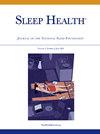美国空军技术训练学生短暂睡眠干预后睡眠结果的种族差异。
IF 3.4
2区 医学
Q2 CLINICAL NEUROLOGY
引用次数: 0
摘要
目的:平民和军人中的少数种族和族裔报告睡眠健康状况比非西班牙裔白人差。针对美国空军受训者的一项以小组为基础的单次短暂睡眠干预改善了睡眠结果,但对种族和民族群体的影响仍不清楚。这一次要分析考察了在短暂睡眠干预后,种族和民族在睡眠结果和行为改变参与方面的差异。方法:选取321名美国空军技术训练学员(平均年龄20.9±3.6岁;男性81.9%;非西班牙裔白人占51.7%;24.3%的西班牙裔;23.4%的非西班牙裔有色人种)。在基线和2周随访时评估工作日睡眠时间和质量以及周末补觉时间。在随访中,短暂睡眠干预的参与者报告了自己选择的行为改变行动。采用倾向得分调整后的逻辑回归模型和线性回归模型。结果:在西班牙裔学生中,与积极对照组相比,短暂睡眠干预组的学生更有可能实现工作日睡眠时间≥6小时,并报告良好/非常良好的周末睡眠。在短暂睡眠干预组中,与非西班牙裔白人和非西班牙裔有色人种学生相比,西班牙裔学生在工作日睡眠时间≥6小时、良好/非常良好的工作日睡眠质量和参与行为改变行动方面的比例高于非西班牙裔白人。结论:与其他种族和民族的学生相比,接受短暂睡眠干预的西班牙裔学生表现出更好的睡眠结果和更高的行为改变参与。进一步的研究应调查导致这些差异的因素,并确定短暂睡眠干预对西班牙裔美国空军学员有效的方面。本文章由计算机程序翻译,如有差异,请以英文原文为准。
Racial and ethnic variations in sleep outcomes following a Brief Sleep Intervention in United States Air Force Technical Training students
Objective
Racial and ethnic minorities in civilian and military populations report worse sleep health than non-Hispanic Whites. A group-based, single-session Brief Sleep Intervention for United States Air Force trainees improved sleep outcomes, yet the effects across racial and ethnic groups remain unclear. This secondary analysis examined racial and ethnic differences in sleep outcomes and behavior change engagement following the Brief Sleep Intervention.
Methods
The sample included 321 United States Air Force Technical Training students (mean age 20.9 ± 3.6; 81.9% men; 51.7% non-Hispanic Whites; 24.3% Hispanic; 23.4% non-Hispanic People of Color). Weekday sleep duration and quality along with weekend catch-up sleep duration were assessed at baseline and 2-week follow-up. At follow-up, Brief Sleep Intervention participants reported engagement in a self-selected behavior change action. Propensity score--adjusted logistic and linear regression models were used.
Results
Among Hispanic students, those in the Brief Sleep Intervention group were more likely to achieve a weekday sleep duration of ≥6 hours and report good/very good weekend sleep compared with those in the active control group. Within the Brief Sleep Intervention group, as compared with non-Hispanic Whites and non-Hispanic People of Color students, Hispanic students showed higher rates of weekday sleep duration ≥6 hours, good/very good weekday sleep quality, and engagement in a behavior change action than non-Hispanic Whites.
Conclusions
Hispanic students who received the Brief Sleep Intervention demonstrated superior sleep outcomes and higher behavior change engagement compared with students from other racial and ethnic groups. Further research should investigate factors driving these differences and identify aspects of the Brief Sleep Intervention that contribute to its effectiveness for Hispanic United States Air Force trainees.
求助全文
通过发布文献求助,成功后即可免费获取论文全文。
去求助
来源期刊

Sleep Health
CLINICAL NEUROLOGY-
CiteScore
6.30
自引率
9.80%
发文量
114
审稿时长
54 days
期刊介绍:
Sleep Health Journal of the National Sleep Foundation is a multidisciplinary journal that explores sleep''s role in population health and elucidates the social science perspective on sleep and health. Aligned with the National Sleep Foundation''s global authoritative, evidence-based voice for sleep health, the journal serves as the foremost publication for manuscripts that advance the sleep health of all members of society.The scope of the journal extends across diverse sleep-related fields, including anthropology, education, health services research, human development, international health, law, mental health, nursing, nutrition, psychology, public health, public policy, fatigue management, transportation, social work, and sociology. The journal welcomes original research articles, review articles, brief reports, special articles, letters to the editor, editorials, and commentaries.
 求助内容:
求助内容: 应助结果提醒方式:
应助结果提醒方式:


